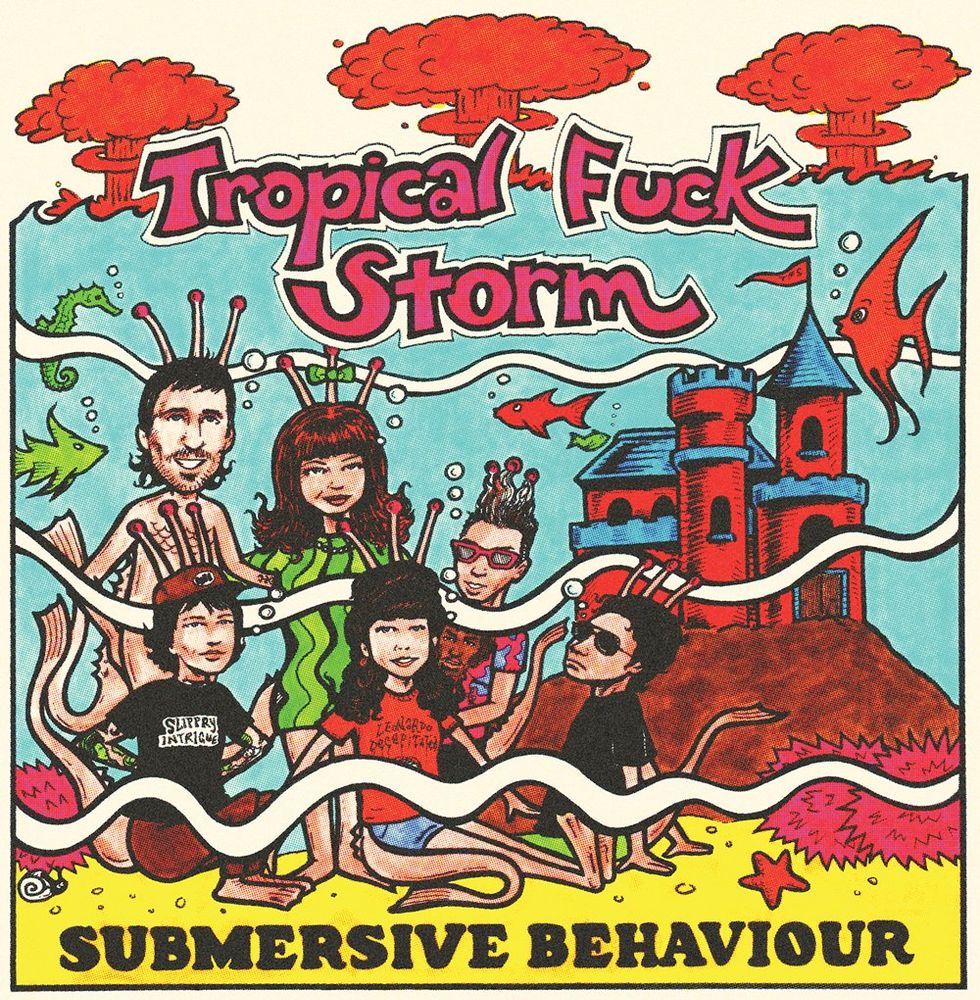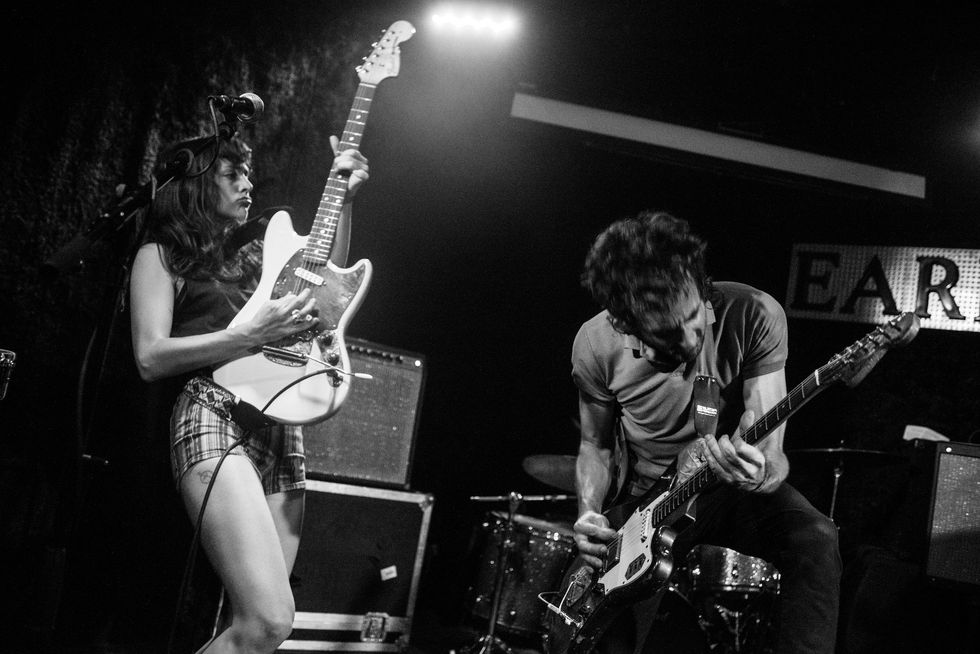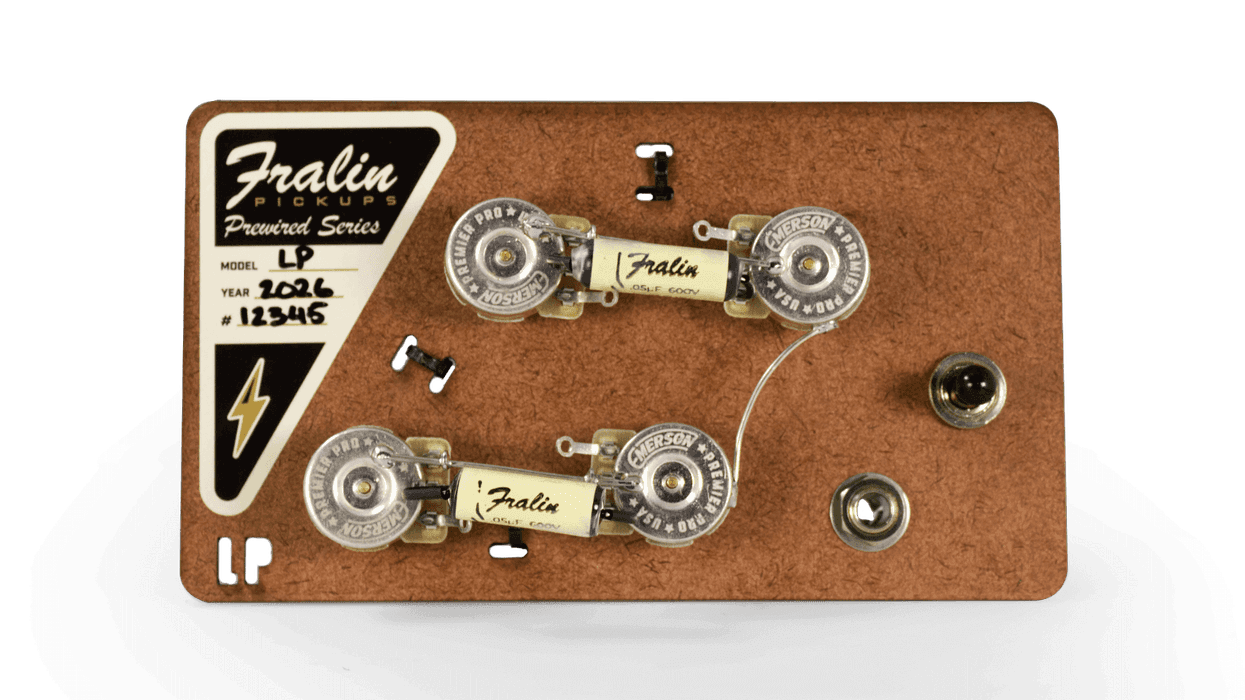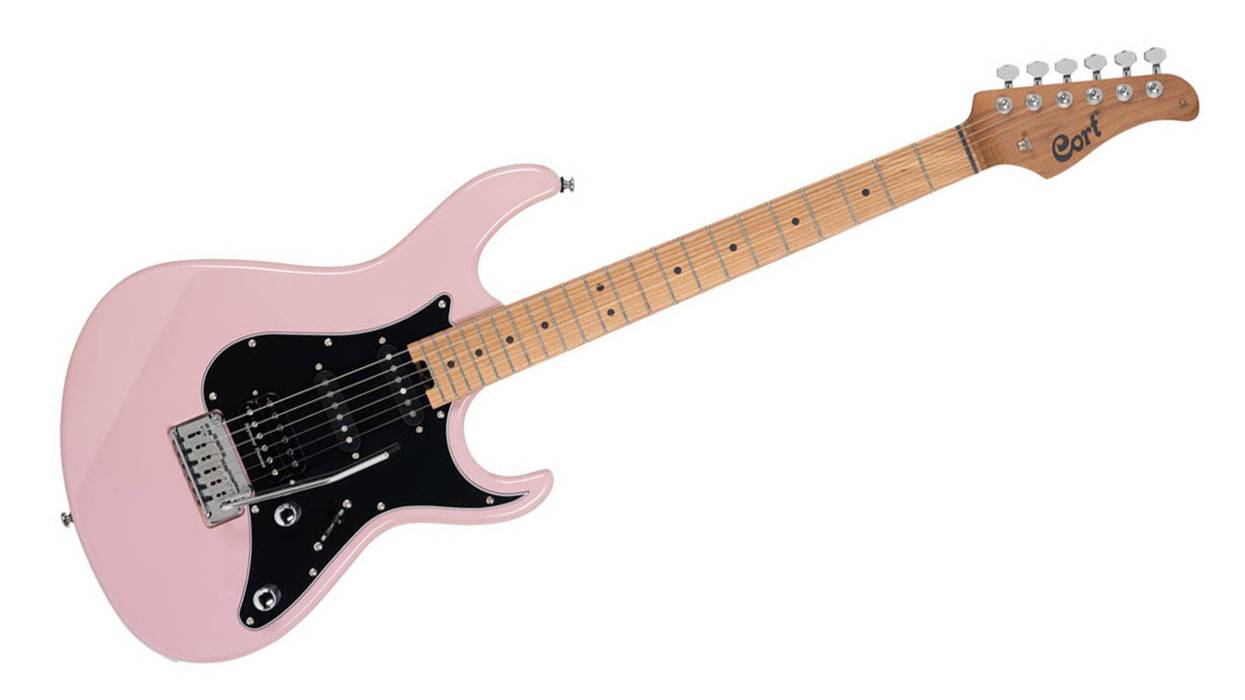In June 2021, while the pandemic was raging worldwide, Gareth “Gaz” Liddiard, who was isolating during one of Melbourne’s many lockdowns, decided he wanted to cover a Jimi Hendrix song. But the vocalist and guitarist for Australia’s Tropical Fuck Storm didn’t want to cover one of the legend’s hits. “I thought, ‘Let’s do a Hendrix song, but what’s the most ridiculous and ambitious one?’” he recalls. He ultimately decided that Hendrix’s “1983 (A Merman I Should Turn To Be)” fit the bill.
The cover is now the centerpiece of Submersive Behavior, the band’s latest release. The Hendrix version of “1983” clocks in at about 13 minutes and features the kind of guitar histrionics one would expect from the legendary guitarist. Tropical Fuck Storm’s version of “1983” is an epic 18-minute swatch of sonic surrealism that honors the original, but also leans heavily on their own energetic style. From Liddiard’s opening guitar salvo, through the acid-trip, synth-psych middle section, the spirit of Hendrix is heartwarmingly embraced, and raucously and inventively reimagined.
1983 (A Merman I Should Turn To Be)
Submersive Behavior is the latest entry in a growing catalog marked by fearless choices. The band’s 2018 debut album, A Laughing Death in Meatspace, was a singular-sounding mashup of post-punk and psychedelia driven mightily by the crafty guitar work of Liddiard and the band’s other guitarist, Erica Dunn. 2019’s Braindrops further solidified their reputation as one of Australia’s most innovative and boundary-busting exports. It featured an eclectic mix of genres and unconventional song structures, laced with the duo’s now-signature effects-saturated, experimentally recorded guitar sounds. With Submersive Behavior, Tropical Fuck Storm is pushing the envelope yet again, this time by gutting and reconstructing the once tried-and-true covers-record concept.
Gareth "Gaz" Liddiard's Gear

Gareth “Gaz” Liddiard says the vast Western Australian desert is one of his biggest influences. Growing up, he didn’t know if he’d ever get out of it.
Photo by Mike White
Guitars
Amps
- Fender Twin Reverb
- Fender Hot Rod DeVilles
- ’60s and ’70s Goldentone amplifiers
- ’70s and ’80s boom boxes in studio
Effects
- 4MS Mr. Ugly
- Bananana Effects AURORA
- Boss LS-2 Line Selector
- DOD Overdrive Preamp 250
- Jackson Audio 1484 Twin Twelve
- Line 6 HX Stomp XL
- Meris Ottobit
- Mid-Fi Electronics Magick “i”
- Montreal Assembly Count to 5
- ProCo Fat Rat
Strings and Picks
- Dunlop Tortex Standard Picks, .88mm
- Ernie Ball 2627 Beefy Slinky .011–.054
Aside from their own self-described “deranged spins” on “1983” and the Stooges’ “Ann,” the other three songs on the 36-minute EP are originals, credited, tongue-in-cheek, to fictitious bands like Men Men Menstruation and Compliments to the Chef. “Those are some of the band names that we used for our first four gigs,” explains Liddiard. “Since we just had that Hendrix song [for Submersive Behavior], and it’s 18 minutes long, it needed a B side, so that’s why you see some pretend band names on the album cover.” Even the title, Submersive Behavior, accurately sums up just how effective Tropical Fuck Storm is at bucking the status quo.
To color outside of the lines has been the band’s inheritance from the beginning. They formed in Melbourne, Australia in 2017, shortly after Liddiard’s previous band, the Drones, went on hiatus. Veteran musicians from Melbourne’s heavy music scene fill out the band, with fellow Drones alum Fiona Kitschin on bass and vocals, Mod Con’s Dunn on guitar and vocals, and drummer Lauren Hammel from High Tension. By combining elements of their previous endeavors, including rock, punk, and experimental music, and spearheaded by lightning-rod lyrics addressing climate change, political corruption, and societal unrest, Tropical Fuck Storm quickly developed a reputation for their musically chaotic live performances and unapologetic worldview.
“There’s lots of bands with guitars and it’s good. But other things, you just go, ‘What the fuck?’ Something’s really happening and it’s that almost careening-out-of-control thing.”
Dunn says restrictions imposed by the lockdown, like having to isolate from one another, set creative parameters that played a big part in the cultivation and evolution of the original material on Submersive Behavior. Liddiard had a hard drive full of jams that the band had shelved as “fuck-ups,” and when he had nothing else to do, he combed back through them, grabbing program and session files that the band had forgotten about. “He was mulling over things and seeing ideas in a new light, and he kind of fell in love with a few things,” says Dunn. “So he set the beds [backing tracks], which were mostly from mistakes. We all were grateful that he went mad. I mean, we were all going mad, but he really put his energy into that. So it was cool. The lockdown was to blame for that. Or maybe we should be grateful.”

After isolating and excavating material from hard drives, Tropical Fuck Storm convened and recorded Submersive Behavior in a house that they rent outside of Melbourne. Liddiard, who does much of the band’s engineering, relied mostly on Pro Tools as his DAW of choice. “We tried Ableton, but it was just too clean,” he says. “If you turn a drum machine on and you turn a metronome on at the same time, they’ll just stay in sync forever. But when we do it in Pro Tools, if you hear a drum machine start one of our songs, if you were to set a fucking metronome in motion, it wouldn’t keep up with the song because it’s all out of whack. It’s cool. We’re the loosest electronic band in history.”
“I thought, ‘Let’s do a Hendrix song, but what’s the most ridiculous and ambitious one?’”
The ways that Liddiard and Dunn interact with each other and arrange their guitar parts is an important pillar of the Tropical Fuck Storm sound. “There was always some conscious effort to get out of each other’s way, and to know where to double down,” says Dunn. “Gaz is just this unbelievable shredder, and my work is to be the bedrock, keeping something repetitive and rhythmic. I think we’ve really got it going now, having played a lot live, and having more intuition about, ‘Well, if you are going to chuck a wheelie, I’m going to hold it down.’ We understand that balance.” Dunn says that process includes making a conscious effort to carve out different sonic territory. For Braindrops, she put all her guitars through a “crappy boom box” to further separate the quality of the guitars.
To build the Hendrix centerpiece of Submersive Behavior, the band tracked the beginning and end of “1983” first, and then recorded the tripped-out middle section separately, making use of synthesizers and “weird shit” laying around. “We didn’t want to go down the route of the Stratocaster noodling in the middle,” says Liddiard. “A friend of ours had a 7′-long spring that bolts to a wall that’s got a pickup on it. And he uses a violin bow—that’s the drone underneath. So we did that. When we cut and pasted it into the song, and it worked, I was like, ‘Wow.’”
Erica Dunn's Gear

The punny new EP, Submersive Behavior, features three new songs credited to fake bands pulled from Tropical Fuck Storm lore.
Photo by Mike White
Guitars
- Shub Jazzmaster with P-90s
- Fender Mustang
Amps
- Fender Twin Reverb
- Roland JC-120
Effects
- Electro-Harmonix Soul Food
- Gojira Fx “Mr Sparkle” Tubescreamer 808
- JHS ProCo Rat “Pack Rat”
- Pickletech Mega Berkatron
- Veternik Audio Fall Reverb
Strings and Picks
- Dunlop Tortex Standard Picks, .88mm
- Ernie Ball 2220 Power Slinky .011–.048
The idea of constructing a separate song section from odd elements, then dropping it into a quintessential classic rock song, sits well within Tropical Fuck Storm’s songwriting ethos. “We’ll try anything,” says Liddiard. “It’s always an act of desperation because when you start a record, there’s nothing. Sometimes we’ll get a drum machine or some kind of weird sampler to start us off in a way that isn’t your stock guitar or drum thing because when you sit down with a guitar and a real drum kit, you fall into habits. So if you can get a crazy little drum machine and plug it into an Eventide delay pitch shifter thing, it’ll come up with some chopped-up strange beat you would never have thought of. And maybe there’s a synth line in there that we’ll try and learn on guitar, and then we start jamming things out. Once we’ve started from that strange spot, we’ll move on.”
According to Liddiard, Tropical Fuck Storm song ideas are forged entirely in the studio and aren’t required to germinate in a live setting before making it onto a record. “Obviously, it’s a patriotic duty in Australia to admire AC/DC,” he chuckles. “But we’re not like them. We make stuff up in the studio, so we don’t even know what it’s going to sound like live when we’re doing it, because we’ve never played it live. We’re just trying to invent something and then we learn it later. Again, it’s desperately trying to get some material together.”
One might imagine that capturing such off-the-cuff-sounding recordings is challenging, but Liddiard’s ability to craft incendiary, seemingly improvised performances in the relatively controlled studio environment is rooted within some of rock’s most influential and freewheeling acts. The ability to toe the line between flawless execution and teetering on the brink of collapse is an art unto itself, and it’s a quality of performance and songcraft that Tropical Fuck Storm wholeheartedly embraces. “The minute I heard Van Halen, it was like hearing Black Sabbath or Led Zeppelin,” he says. “There’s lots of bands with guitars and it’s good. But other things, you just go, ‘What the fuck?’ Something’s really happening and it’s that almost careening-out-of-control thing. I love that. It’s a fun thing to do.”
“We’re just trying to push it out there and keep it fresh and interesting. It’s like Hendrix or Captain Beefheart, just looking for something that hasn’t been done.”
Despite the experimental, loose nature of their songwriting and recording process, Liddiard says a lot of his ideas should translate easily enough to and from an acoustic guitar. “Generally, everything we do is doable in the real world,” he says. “I’ll noodle on the acoustic guitar because you might have a riff, but you want to know what key it’s in, and then you want to know what keys you can move to as well.” But starting songs with guitars and ending with guitars is not something that particularly inspires him these days.
“I’ve been in bands for years, so with Tropical Fuck Storm, we’re just trying to push it out there and keep it fresh and interesting,” he says. “It’s like Hendrix or Captain Beefheart, just looking for something that hasn’t been done. Those are my favorite things. The adventurers like Van Halen or even people like Hubert Sumlin from Howlin’ Wolf…. He had a kooky style that no one had. He introduced the whole eccentric kookiness to that electric guitar thing.”

Tropical Fuck Storm like to experiment. To achieve greater separation of guitar tracks while recording, guitarist Erica Dunn ran her guitars through a busted old boom box.
Photo by Mike White
Dunn shares a lot of the same influences with Liddiard, including Hendrix, but ultimately describes herself as a very “tactile, hands-on sort of person,” and a bit more of a minimalist than Liddiard in terms of effects pedals. “I’m not like Gaz, who is a full-on, self-described nerd when it comes to pedals and knowing them and taking them apart and building them and making them work,” she explains. “I find a thing and I generally stick to it and then I push those parameters. Sometimes, if I’m given too much, I’m overwhelmed, and I shut down.” With that in mind, one of her preferred, go-to effects in any situation is a JHS-modded ProCo Rat. “It’s sort of your base-level sound effect. We had a show the other day and it looked like our bags weren’t put on the airplane and we were just laughing about what we might be able to borrow or beg or steal to make the show happen. And I thought, ‘If someone has a Rat around, I’ll be alright.’”
“I gravitated to the metallic clang of a guitar, the rusty, barbed wire sound like early AC/DC or Neil Young.”
When it comes to framing out their own territory in the modern musical landscape, one of the most significant influences that continues to profoundly affect the Tropical Fuck Storm sound is their geographical upbringing. Had Liddiard not grown up in Western Australia, they simply would not be the same band. “Western Australia is like Southern California or Arizona,” he says. “Really dry desert, but it’s also super vast. So I gravitated to the metallic clang of a guitar, the rusty, barbed wire sound like early AC/DC or Neil Young. It seemed to make more sense and it had a vastness in it because there’s literally nothing out there.”
Western Australia occupies a geographical space roughly the size of the lands between the Rocky Mountains and the West Coast of California. But in the U.S., there are densely populated cities and millions of people occupying that area. “In Western Australia, there’s just nothing,” Liddiard says. “There’s one city, and it really did have an effect.”
When Liddiard was a teenager in the ’90s, he felt like he couldn’t escape. He was too far from anywhere. But somehow, things worked out. “You feel so trapped and you feel like everything that’s happening in music is happening somewhere else, and you’ll never be a part of it,” he says. “There was never any pretension or effort to conform in any way musically. So we just did our own thing.”




















![Rig Rundown: Russian Circles’ Mike Sullivan [2025]](https://www.premierguitar.com/media-library/youtube.jpg?id=62303631&width=1245&height=700&quality=70&coordinates=0%2C0%2C0%2C0)






